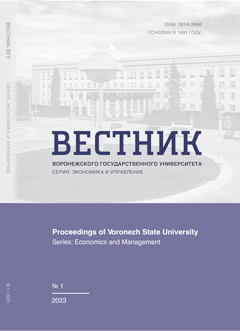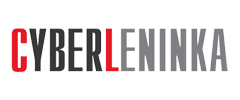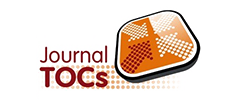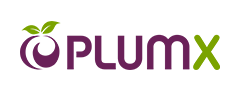Производственный контроль в системе управления корпоративной организацией
Аннотация
Предмет. Отечественные и зарубежные исследователи в настоящее время уделяют существенное внимание несовершенству корпоративной культуры российских организаций. В рамках построение корпоративной культуры обоснована необходимость разработки дополнительных мер в части обеспечения независимости функционирования внутренних контролеров, повышения уровня их заинтересованности в достижении максимальных результатов деятельности корпоративной организацией, необходимость выделения в системе внутреннего контроля производственного контроля бизнес-процессов корпорации. Выделенные аспекты подтверждают актуальность проведенного исследования.
Цели. Развить теоретические основы производственного контроля для решения прикладных задач в области достижения безопасности и финансовой устойчивости корпоративных организаций.
Методология. В процессе достижения поставленных целей использовались методы моделирования, сравнения, приемы систематизации информации, позволяющие обобщить теоретические и организационные аспекты производственного контроля деятельности корпорации.
Результаты. Уточнено определение производственного контроля деятельности корпорации, его предмет и цели, детализированные задачами его осуществления. Определены субъекты и объекты производственного контроля, выделены принципы его осуществления. Обоснована необходимость внедрения инструментария производственного контроля как важного элемента в системе управления корпоративной организацией.
Выводы. Предложенный подход к организации производственного контроля может быть внедрен в практическую деятельность корпоративных организаций различных видов экономической деятельности, что позволит снизить уровень существенности производственных рисков.
Литература
Andreev, V.D. (2019) [Fundamentals of integrated risk-oriented internal control and audit of economic entities : textbook]. Moscow : Master: INFRA-M. (In Russian).
Vetrova, I.F. (2016) Professional standards on internal control and auditing. Accounting. Analysis. Audit. 5, 74-87.(In Russian)
Vorontsov, P.G. (2019) Trends in developing corporatemanagement in companies with stateparticipation in the Russian Federation. Bulletin of the Plek-hanov Russian University of Economics. 1 (103), 195-204.(In Russian)
Glushchenko, A.V. & Ivanov, Ya.V. (2020) The system of controlling an organization as a basis for making managerial decisions. Accounting in budgetary and non-profit organizations. 23 (503), 33-39. (In Russian)
Endovitsky, D.A. et al. (2019) [Procurement of goods, works, services: regulation, analysis and control : monograph].Voronezh : VSU Publishing House. (In Russian)
Efimova, O.V., Kashirsky, L.V. & Sitnov, A.A. (2018) Organization of in-ternal control system and risk management of accounts receivable in gas supply organizations. Auditor. 4 (6), 31-41. DOI: 10.12737/article_5b309dc2e2e882.28358134.(In Russian)
Kasyuk, E. A. (2016) Internal functional control in the management of economic actors. Entrepreneur’s Guide. 30, 62-68. (In Russian).
Kevorkova, Zh.A. (2021) Methodological aspects of it audit as a tool for improving the eff ectiveness of internal control. Auditor. 7 (1), 25-29. DOI: 10.12737/1998-0701-2021-25-29.(In Russian)
Loginova, T.V. (2017) [The essence of controlling and its role in the effec-tiveness of the organization]. Science of the 21st century: questions, hypotheses, answers. 2 (23), 49-54.(In Russian)
Mavlyutov, R.R. & Chubenkov, O.V. (2018) [Assessment of the econom-ic feasibility of implementing and modernizing the controlling system at Russian enterprises]. Financial Economics. 6, 847-849.
Melnik, M.V. & Vetrova, I.F. (2017) [Organization of the internal control and audit system in corporate structures. Corporate governance: questions of theo-ry, problems of practice : collective monograph]. St. Petersburg : St. Petersburg State University of Economics. 66-85.
Morozova, E.S. (2018) Changes in the risk management concept within the framework of the internal control system of the economic subject. Problems of enterprise development: theory and practice. 3, 122-126.
Plaskova, N.S. (2020) Financial controlling as a function of managing an organization's strategy.Accounting. Analysis. Audit. 7 (5), 24-32.
Serebryakova, T.Yu. & Biryukova, O.A. (2021) [Internal control and con-trolling : a textbook]. Moscow : INFRA-M.
Sheremet, A.D. (2019) Some problems of audit development.Audit. 1, 2-9.
Shitova, T.F. (2018) Controlling: application of the information analysis system «1C: ERP Enterprise management 2». International Accounting. 21, 9 (447), 1007-1023.
Wang, J. & Hooper, K. (2017) Internal control and accommodation in Chinese organisations. Critical Perspectives on Accounting. 49, 18-30. DOI: 10.1016/j.cpa.2017.04.003.
Bakera, C.R., Cohanierb, B., & Leo, N.J. (2017) Breakdowns in internal controls in bank trading information systems: The case of the fraud at Société Gé-nérale. International Journal of Accounting Information Systems. 26, 20-31. DOI: 10.1016/j.accinf.2017.06.002.
Zumoffen, D.A., Braccia, L. &Marchett, A.G. (2016) Economic plant-wide control design with backoff estimations using internal model control. Journal of Process Control. 40, 93-105. DOI: 10.1016/j.jprocont.2016.02.002.
Hulstijn J. et al. (2011) Continuous Control Monitoring-Based Regulation: A Case in the Meat Processing Industry. In Advanced Information Systems Engineering Workshops. Eds. 83, 238-248. DOI: 10.1007/978-3-642-22056-2_26.
Copyright (c) 2022 Коробейникова Л.С., Черкасова К.А.

Это произведение доступно по лицензии Creative Commons «Attribution» («Атрибуция») 4.0 Всемирная.























